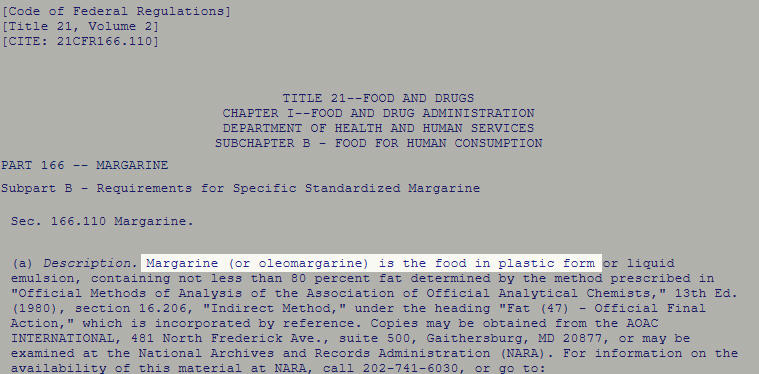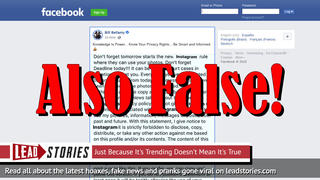
Is it true that there was no Alzheimer's disease until 1979 -- after the vegetable oils used in margarine were incorporated widely in modern diets? No, that's not true: In 1906 the "unusual disease of the cerebral cortex" was discovered by pathologist Alois Alzheimer. The abnormal brain atrophy he had identified was named after him four years later. An expert in nutrition and Alzheimer's told Lead Stories the claims that seed oils or margarine cause Alzheimer's are not scientifically founded.
The video making this claim appeared in a post (archived here) on X on January 7, 2025. The post was captioned:
Myelin👇‼️
This is how the post appeared at the time of writing:
(Source: X screenshot taken on Wed Jan 08 21:11:20 2025 UTC)
The man in this 2:48-minute-long video makes several false claims.
At 0:05 seconds: He says 75 percent of human brain is made up of myelin
This is false. A July 15, 2014, article, "Myelination at a glance" (archived here) published in the Journal of Cell Science and citing a paywalled 1980 article in Scientific American, it is explained:
In humans, around 40% of the brain contains white matter comprising densely packed fibres, of which myelin is a main component (50-60% dry weight of the white matter)
At 0:10 seconds: He says myelin is 100 percent cholesterol
No, only 70 to 85 percent of the myelin sheath is composed of lipids and of that, only 40 percent of the myelin sheath lipids are cholesterol, as described in section 2 (archived here) of the article "Myelin Fat Facts: An Overview of Lipids and Fatty Acid Metabolism" published on March 27, 2020, in the journal Cells:
The myelin sheath is characterized by a high proportion of lipids (70%-85%) and consequently a low proportion of proteins (15%-30%).
The lipid composition of myelin sheath is distinctive, made of high amounts of cholesterol and enriched in glycolipid, in a ratio of 40%:40%:20% (cholesterol, phospholipid, and glycolipid, respectively) compared to most biological membranes (25%:65%:10%)
At 0:30 seconds: He says Alzheimer's disease never existed until 1979
This is not true. In 1906 pathologist Alois Alzheimer (archived here) discovered an "unusual disease of the cerebral cortex" in the autopsy of a German woman, Auguste Deter (archived here). She had died at 55 after exhibiting symptoms during the last five years of her life usually only seen in the elderly. In 1910 the name Alzheimer's disease appeared in the 8th edition of the "Handbook of Psychiatry."
At 0:40 seconds: He says margarine was first invented in 1869 because Napoleon wanted a cheaper, longer-lasting fat for his armies to travel with
Not Napoleon I, who catastrophically marched his army all the way to Moscow -- that Napoleon Bonaparte died in 1821. It was his nephew, Napoleon III, who in 1869, gave an award to the French chemist Hippolyte Mège-Mouriès (archived here) who had developed a butter substitute.
At 1:05 minutes: He says animal fats had been replaced with vegetable oils to make a lower-cholesterol alternative -- suggesting, without coming out and saying it, that this reduction in cholesterol is responsible for Alzheimer's
Lead Stories emailed Dr. Hussein Yassine (archived here), a professor of neurology at the University of Southern California's Keck School of Medicine. The Yassine lab (archived here) "specializes in how changes in lipid metabolism and nutrition affect the brain and risk of developing Alzheimer's disease." We shared the video, and asked Yassine if there is any evidence that margarine caused Alzheimer's disease and if there are any foods or dietary trends that cause or prevent Alzheimer's. Yassine's response on January 9, 2025, included a paper published in The Lancet (archived here) along with these comments:
The claims that seed oils or margarine are the causes of Alzheimer's are not scientifically founded.
Analyzing the literature on nutrition and Alzheimer's risk is complex and can contain conflicting results. Unfortunately there are no quality studies that I can cite.
I attach our paper on how we interpreted this literature and some guidelines for path forward.
But to answer your question, dietary patterns are more important that single diets, micronutrients or supplements and dietary patterns include someone's lifestyle.
An individuals consuming a moderate amount of vegetable oils with a healthy lifestyle that includes exercising, no smoking, less processed meats, less sugar intake, and exposure to sun may be different than an individual who consumes seed oils but also smokes or does not exercise or who consumes fast food. This is an example and a not a specific recipe.
At 1:30 minutes: He says margarine is one molecule away from being plastic
This claim has been widely repeated and in 2019 was the subject of a Lead Stories fact check. Dr. Harriet Hall, a retired family physician who passed away in 2023, began her response to Lead Stories' query on the claim by saying:
This is absurd and was obviously made up by someone with no understanding of chemistry.
For this fact check, we found a Food and Drug Administration document about margarine (archived here) in the Code of Federal Regulations (pictured below) dating back to 1977 and revised several times since. This may have been at the root of a misunderstanding that gave rise to the false claim about plastic. The description in the section on standardized requirements begins:
Sec. 166.110 Margarine.
(a) Description. Margarine (or oleomargarine) is the food in plastic form or liquid emulsion, containing not less than 80 percent fat determined by the method prescribed in 'Official Methods of Analysis of the Association of Official Analytical Chemists,'
In this context the word plastic is not referring to the polymer type of plastic material, but the malleable quality of being shaped or formed (archived here).
(Source: Lead Stories markup of fda.gov screenshot taken on Thu Jan 09 20:26:58 2025 UTC)
Additional Lead Stories fact checks on claims associated with Alzheimer's disease can be found here.
























